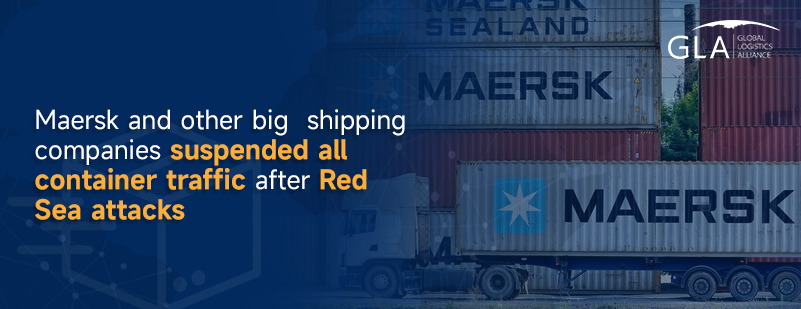Time:2023-12-24 Publisher:Kevin Num:6154

In the tumultuous waters of the Bab al-Mandab Strait, a near-miss incident involving the Maersk Gibraltar has sent shockwaves through the maritime community. This incident, coupled with a targeted attack on a container vessel, prompted Maersk and other big shipping companies including MSC, Hapag-Lloyd, CMA CGM, ZIMBABWE, Evergreen Marine CORP, Yang Ming, COSCO Shipping, OOCL, and ONE to take decisive action, instructing all vessels in the area to pause their journeys. In this article, we delve into the unfolding events, examining the potential ramifications for seafarers and the maritime industry.
Maersk's official statement emphasizes the gravity of the situation, stating, "Following the near-miss incident involving Maersk Gibraltar yesterday and yet another attack on a container vessel today, we have instructed all Maersk vessels in the area bound to pass through the Bab al-Mandab Strait to pause their journey until further notice."
Maersk, MSC, Hapag-Lloyd, CMA CGM, ZIMBABWE, Evergreen Marine CORP, Yang Ming, COSCO Shipping, OOCL, and ONE have collectively decided to temporarily halt their operations through the Red Sea. This strategic move comes as a response to the evolving geopolitical situation in the region, with the companies prioritizing the safety and security of their vessels and crews.
As the fleets of Maersk came to a temporary halt, the world anxiously awaited updates on the situation. The Maersk Gibraltar, a crucial vessel navigating the treacherous waters of the Bab al-Mandab Strait, found itself in the crosshairs of a missile attack. The initial reports, however, brought a sigh of relief - both the crew and the vessel were reported safe. Yet, the gravity of the situation was not lost on Maersk, prompting a thorough investigation and heightened vigilance.
Maersk, deeply concerned about the escalating security situation in the Red Sea and Gulf of Aden, issued a stark warning about the threat posed by recent attacks on commercial vessels. The safety and security of seafarers, already facing myriad challenges at sea, are under a renewed and ominous shadow. This development underscores the fragile nature of maritime security and the pressing need for international collaboration to safeguard vital sea routes.
The recent attacks provide an opportunity for reflection on the broader implications for seafarers and global trade. The maritime industry must adapt and fortify its defenses against emerging threats. This includes investing in advanced surveillance technologies, enhancing intelligence-sharing mechanisms, and fostering international cooperation to address the root causes of maritime instability.



